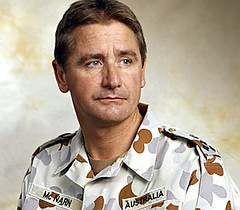The press are full of anti US stories. Greg Sheridan shamelesly piles accusation upon accusation that promotes the image of Australia' s Major General McNam at US expense.
I suspect that Major General McNam played the role as he was supposed to. Oversight is an essential role.
However things panned out, it is testimony to the man, the nation and the political party that sent the man with the right equipment to execute his function.

Aussie veto stopped war crime
ReplyDeleteBy Cameron Stewart
AUSTRALIA intervened to stop key US military strikes against Saddam Hussein's regime in Iraq, fearing they might constitute a war crime.
Major General Maurie McNarn, then a brigadier and commander of Australian forces in Iraq, on several occasions played a "red card" against the American plans, which included hits on individuals. His objections drew anger from some senior US military figures.
In one instance, Major General McNarn vetoed a US plan to drop a range of huge non-precision bombs on Baghdad, causing one angry US Air Force general to call the Australian a "pencil dick".
However, US military command accepted Major General McNarn's objection and the US plans were scrapped.
The revelation of how Australia actively and successfully used its veto power in the 2003 invasion of Iraq is contained in a new book on the US-Australian alliance, The Partnership, by The Weekend Australian's foreign editor, Greg Sheridan.
The book reveals that Australia, as a member of the so-called coalition of the willing in Iraq, was given a power known as a "red card" that allowed Major General McNarn to veto US military actions, including individual targets and the types of weapons used.
Australia's proactive use of the veto power - on strategic, military and ethical grounds - helped the Americans produce a more effective and ethical targeting policy during the war.
The book reveals that Major General McNarn - now the head of the Defence Intelligence Organisation - delivered a "great shock" to the US when he first used the red card and then put his objections to the proposed US military strike in writing.
"Shit," exclaimed one American when he saw the document. "What if this leaks?" Major General McNarn replied that if the US did not take the illegal action, it would not matter.
As coalition forces prepared plans to take Baghdad, Major General McNarn vetoed three of five proposed US Air Force weapon systems - mostly huge bombs - on the grounds that they were not accurate for a radius of less than 16m and, as a result, were unsuitable for use in a built-up area.
One another occasion, Australia, along with fellow coalition partner Britain, successfully whittled down a list of proposed individuals the US considered legitimate targets.
The book also reveals that before the war, which started in March 2003, Australia made repeated efforts to get the US to focus on post-conflict planning in a more coherent way.
The lack of early US planning for the post-war phase in Iraq is seen to have contributed substantially to the violent disorder now being experienced there.
Australia also argued for the US to try to involve the UN as much as possible after the war. However, in a frank conversation with Foreign Minister Alexander Downer on April 1, 2003, US President George W.Bush said the US would get the blame for destroying Iraq and he did not want others coming to rebuild it.
"The UN can't manage a damn thing," Mr Bush told Mr Downer, recalling his visit to Kosovo, where the President found the UN personnel to be "a bunch of drunks".
The book also reveals that immediately after the fall of Baghdad, Mr Downer told Paul Bremer, head of the Coalition Provisional Authority in Baghdad, that the coalition should leave as soon as it could, while Iraq was in a decent state.
Since then, the Howard Government has argued it would be wrong to "cut and run" from Iraq and says Australian troops will remain there for as long as they are needed.
The book also reveals how close and frank the bilateral relationship became in the months leading up to and during the war in Iraq.
It includes an account of a conversation between Mr Downer and Mr Bush in April 2003 in which the President likened North Korea's erratic leader, Kim Jong-il, to "a child who throws his food on the floor and expects all the adults to rush over and pick it up".
At the same meeting, Mr Bush warned Mr Downer that Australia was likely to suffer casualties on the ground in Iraq, but he expressed unqualified admiration for the "brave, skilled fighters" of Australia's elite SAS.